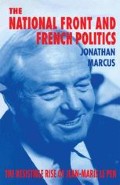Abstract
Under the strong conservative Presidential regime of the Fifth Republic, the Far Right struggled for over two decades to make any electoral impact at all. In the Presidential election of 1965 Jean-Louis Tixier-Vignancour, a former minister in the Vichy government and longstanding Far-Right notable, capitalised on rancour at the granting of independence to Algeria to obtain 5.3 per cent of the vote. However, the extreme right-wing surge came and went. The Far Right, a heterogeneous collection of groups, fragments and individuals, seemed to have been entirely marginalised by the dominance of the mainstream Right: first the Gaullists, and then the duopoly of the RPR and the coalition of liberal and centrist parties, the UDF.
Access this chapter
Tax calculation will be finalised at checkout
Purchases are for personal use only
Preview
Unable to display preview. Download preview PDF.
Notes
For the exploitation of the theme of immigration during the campaign, see Le Monde, 13 March 1983. For an analysis of the campaign, see J. Marcus and C. Dorgan, ‘Trench Politics and the Municipal Elections of March 1983’, The Political Quarterly, 54 (1983) 307–12.
In Vernouillet (Eure-et-Loire) and Chêteauneuf-sur-Charente (Charente) National Front candidates scored 11.6 per cent and 10.2 per cent. See Gerard Le Gall, ‘Un recul du “bloc au pouvoir” moindre en 1983 qu’en 1977’, Revue politique et parlementaire, 903 (1983), 11–41.
See P. Perrineau, ‘Le Front National: 1972–1992’, in M. Winock (ed.), Histoire de l’extrème droite en France (Paris: Seuil, 1993).
S. Hoffmann, Le Mouvement Poujade (Paris: Armand Colin, 1956), passim.
J. Jaffré, ‘Front National: la relève protestataire’, in E. Dupoirier and G. Grunberg (eds), Mars 1986: la drôle de defaite de la gauche (Paris: Presses Universitaires de France, 1986).
G. Le Gall, ‘Mars 1986: des elections de transition?’, Revue politique et parlementaire, 922 (1986) 6–18.
Le Monde, 26 April 1988. For analysis, see J. Marcus, ‘French Politics after the Elections’, The World Today, (October 1988), 173–6. Also P. Perrineau, ‘Le Front national et les élections: L’exception présidentielle et la règle législative’, Revue politique et parlementaire, 936 (1988), 34–41.
As Pascal Perrineau emphasised in an interview with the author, the apparent coincidence between the decline of the Communist Party and the rise of the FN is a complex phenomenon and difficult to approach in a quantitative manner. While there is little evidence for direct transfers of PCF voters to the Front, there is strong circumstantial evidence, at the very least, to suggest that the Front has to some extent come to replace the PCF in its ‘tribune role’, in areas of former Communist strength. One suggestion is that disillusioned former Communist voters may take refuge in abstention for some years before drifting into a vote for Le Pen. See E. Plenel and A. Rollat, L’effet Le Pen (Paris: La Découverte/Le Monde, 1984), pp. 118–23
See also F. Platone and H. Rey, ‘Le FN en terre communiste’ in N. Mayer and P. Perrineau (eds), Le Front national à découvert (Paris: Presses de la Fondation nationale des sciences politiques, 1989).
SOFRES poll in Le Monde, 6 January 1989. See also N. Mayer and P. Perrinneau, ‘La puissance et le rejet ou le lepénisme dans l’opinion’, in O. Duhamel and J. Jaffré (eds), SOFRES: L’état de l’opinion 1993 (Paris: Seuil, 1993).
P. Perrineau, ‘Le Front national: les cléfs de la défaite’, Revue politique et parlementaire, 940 (1989), 19–24.
G. Le Gall, ‘Un triple avertissement: pour l’Europe, la démocratie et les Socialistes’, Revue politique et parlementaire, 942 (1989) 11–20.
F. Gaspard, ‘L’évolution du F.N. à Dreux et dans les environs (1978–1989)’, Revue politique et parlementaire, 945 (1990), 62–9.
J. Marcus, ‘France: Punishing the Socialists’, The World Today (June 1992), 99–100. Also G. Le Gall, ‘Elections: les handicaps du pouvoir face à 1993’, Revue politique et parlementaire, XXX (1992) 3–13.
J. Jaffré, ‘La défaite des socialistes et l’insatisfaction des electeurs’, Pouvoirs, 62 (1992), 135–49.
N. Mayer and H. Rey, ‘Avancée électorale, isolement politique du Front national’, Revue politique et parlementaire, 964 (1993), 42–8.
Copyright information
© 1995 Jonathan Marcus
About this chapter
Cite this chapter
Marcus, J. (1995). The Electoral Rise of the National Front. In: The National Front and French Politics. Palgrave Macmillan, London. https://doi.org/10.1007/978-1-349-24032-6_4
Download citation
DOI: https://doi.org/10.1007/978-1-349-24032-6_4
Publisher Name: Palgrave Macmillan, London
Print ISBN: 978-0-333-64648-9
Online ISBN: 978-1-349-24032-6
eBook Packages: Palgrave Political & Intern. Studies CollectionPolitical Science and International Studies (R0)

